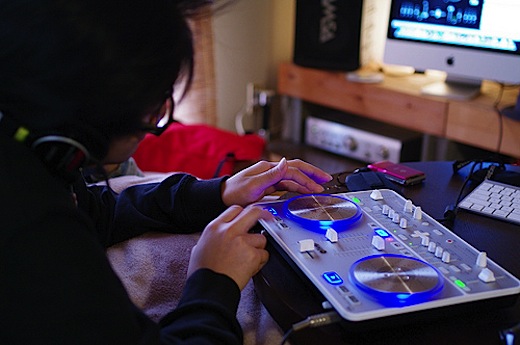
You look forward to that precious few hours when you can finally get powered up and do some DJ practice at home, and you’re smart enough to know just how valuable regular practice can be. You’re not one of those “it ought to come easy!” people, and you realise that to get good at this you need to put the hours in. Which makes it all the sadder that you, me, all of us can sometimes feel like we’re getting nowhere. Like we’re going round in circles, doing the same old things and not getting better. Like… there’s just not much progress being made! Ever felt that way? Here’s some tips as to how to break through and start getting real results from your DJ practice sessions:
1. Get the “preparation” stuff done at another time
You don’t want to fall into the trap of counting listening to new music, setting loops, setting cue points and so on as part of practice, as truth is that being a good selector of music (particularly if you cover multiple genres) requires you to spend time listening to a lot of new music and figuring out what to put in the crate and how likely you are to play it and where.
But this isn’t the same as practising, and actually, there’s no need to let this stuff eat into your precious practice time anyway nowadays, because using a laptop (or an iPad/iPhone with Traktor DJ) you can prep your files anywhere nowadays. I find that using “personalised keywords” in the comments while doing this really helps me to quickly call up tracks during my next practice session.
You can further reduce the time needed to fill your “box” with the right tunes pre-practice session by acquiring new music with a great deal of intention. You can set goals depending on the time available, the mixes you’re working on or the gigs you’ve got coming up. With today’s tools, this stuff – whether scouring SoundCloud for that underground mix you’re trying to finish, checking out a new territory on Mediabase for an out of town gig, or just setting yourself the target to find three new tunes on your bus journey home using your digital download pool’s iPhone app (DJCity has a good one) – this is easy.
Listening to and then crating all this music is important to stop you hitting the start of your practice session without the required tools to make the most of it, meaning discovery and preparation then have to dig into this precious time.
2. Have a practice routine
Time behind the decks is limited, so once again, I like to start a session with some intention and a plan. I will almost always start a session with just some juggling and a little scratch pattern work to warm up, but after that, I usually go to what I’ve planned for the day.
Do I plan to get more familiar with my Midi controller, or try out a new mapping? Do I want to work on effects? Do I want to try out some new trap music to build on that part of my repertoire? I look at the amount of time I have available and try to set a realistic goal. Sometimes I have enough notes of transitions I wanted to try out or things of that nature, then I really try to work my way through all of them. Making a note of such things on your smartphone whenever they occur to you can really help here, because you’re not groping around for inspiration as the clock ticks.
3. Have fun… but learn to get more out of your “fun”!
Writer Peter DeVries once said ““I only write when I’m inspired, and I make sure I’m inspired every morning at 9am!” It’s a smart move to hold yourself to a little more scrutiny than just messing around on the decks, even if that’s what you’ve decided to do with today’s session. One way to “feel the sensation of a crowd” is to force yourself to Ustream and record your home mixing when you’ve decided you just want to play around. This forces you to be a little more purposeful when trying to put new songs together, while still letting you cut loose and rock out a bit.
I do this regularly, and while I know I am just “having fun”, knowing there are a few people listening forces me to use at least some of that same logic I use for a crowd at an event, and I get to sharpen that skill set.
Finally…
By goal setting, stripping out stuff that you don’t need to do when stood in front of your gear, and using memory joggers (like “sticky notes” on smartphones, comments added to songs when listening in the week and so on), you can get the music right without encroaching on your practising. And by thinking smartly about the best way to get the most from what you feel you want to that day, you can be true to yourself (after all, this is meant to be fun), while still maximising your results, which means you’ll have more fun, while getting better, faster. I wish you luck!
DJ Mister Wilson is a DJ from Los Angeles where he walks the fine line between “being an underground selector and dancefloor motivator”. Find him on Mixcrate





![Stems Sound Quality, Pre-Planned Sets, Making Mashups [Live Q&A] Stems Sound Quality, Pre-Planned Sets, Making Mashups [Live Q&A]](https://cdn.digitaldjtips.com/app/uploads/2024/01/18210824/stems-qual-blank-WEBSITE.jpg)


